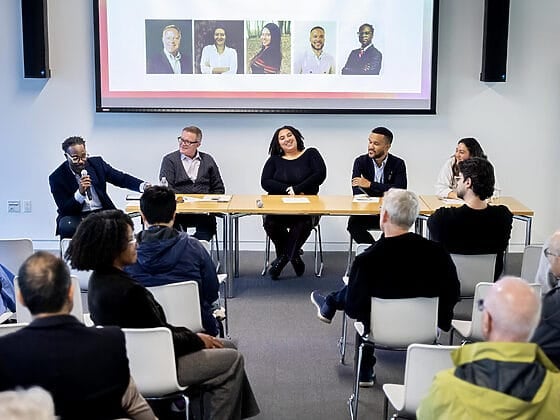News Details
Harnessing technology in research to improve well-being

Authored by: Erica Moser, Penn Today
Photography by: Eric Sucar
Faculty & Research
10/23/25
As part of the Politics of Well-Being speaker series, researchers in the School of Social Policy & Practice talked about their work helping governments address social issues and creating a joy-centered framework for AI development.
State and local governments maintain a wide range of data, from child welfare and early education to health care and housing, but they may lack the capacity to integrate data across agencies to address social problems. That’s where Actionable Intelligence for Social Policy (AISP), housed in Penn’s School of Social Policy & Practice (SP2), comes in.
“We’ve been trying to speed up the process by which research can be delivering actionable information to government agencies,” says professor Dennis Culhane, AISP’s co-founder and faculty director. AISP now has 35 state and 12 county governments in its network, and staff connect government workers across states who may not realize they’re doing the same work and facing the same challenges.
In one project, AISP is using social service data to see where pre-K is most needed in Philadelphia. In another, AISP members are using housing placement data to track the impacts of homelessness on hospitalizations, shelter use, and incarceration. They conduct their analyses with a focus on artificial intelligence, algorithms, and how bias can show up in data.
This is just one example of how SP2 faculty, staff, and students are researching the impacts—good and bad—of data-driven systems on societal well-being.
Culhane spoke about this work during a recent event on technology and well-being, the second in the year-long Politics of Well-Being speaker series cosponsored by SP2 and the Andrea Mitchell Center for the Study of Democracy.
Shana Kleiner, assistant director of SAFELab and the Penn Center for Inclusive Innovation & Technology (PCIIT), discussed the work SAFELab has done to design a framework for centering joy in the development and deployment of AI systems.
“I urge you all to throw what we think we know about AI out, and let’s just start from what it’s like to be joyful and to be alive,” she said. We live in a world, she continued, where large language models are trained to focus not on promoting joy but on avoiding bad things in our lives—such as depression and loneliness. She further noted that the people designing these models “aren’t thinking about joy or pleasure; they’re thinking about addiction.”
The researchers’ framework urges engineers to consider a few questions. What happens when joy is used as a tool for AI imagination and design? What processes are needed to train models to identify joyful concepts? What is the hope or promise of joy-centered AI?
SP2 assistant professor Millan AbiNader, chair of the planning committee for the Politics of Well-Being series, says her hope for the set of programs is that “people are energized to be social change agents and can think of tangible things that they can do to improve well-being. We have amazing faculty here at SP2, and I hope others are inspired by their work just like I get to be by my colleagues every day.”
Each speaker series event highlights SP2 research and is accompanied by a hands-on activity on Locust Walk. For example, prior to the tech and well-being event, students were invited to pose questions to a therapist and ChatGPT, comparing how each approached issues like anxiety.
“Why would someone turn to AI rather than a therapist?” asked SP2 Ph.D. student Tony Shaw, who moderated a roundtable discussion with Culhane, Kleiner, Isabel Algrant, and Ken Miles. The panel also touched on building trust with communities impacted by research and making work accessible to the public.
Algrant, assistant director of training and technical assistance at AISP, said in response to Shaw’s initial question that she thinks that due to the pandemic, a lot of people in their 20s have experienced a lack of human connection at a critical time. She noted, “A real human therapist is going to read you [and] is going to ask you things you might not want to hear, whereas a robot isn’t going to do that to you. It’s not going to challenge you in that same way—it might flatter you.”
Some people may turn to AI in the place of a therapist due to structural barriers such as insurance coverage and costs, noted Miles, executive director of PCIIT. “For certain folks, there’s an urgency to the need to have access to the insights on the other side of that experience,” he said, and people may see AI as a shorter path compared to the challenges and frictions of finding a therapist.
The next event in the Politics of Well-Being series is about economics and well-being and will take place Nov. 20 from 4:30 to 6 p.m. in the Perelman Center for Political Science and Economics. See the full schedule and list of speakers.
This story was originally published on 10/21/25 in Penn Today.
People
-

Dennis P. Culhane, PhD
Professor
Contact
office: 215.746.3245
fax: 215.573.2099
Email
-

Ken Miles
Executive Director, Penn Center for Inclusive Innovation & Technology
Contact
office: 215.746.8056
Email
-

Shana Kleiner, LMSW
Manager, Center for Responsible Innovation & Technology
Contact
Email
-

Isabel Rose Algrant, MSSP + DA
Assistant Director of Training & Technical Assistance, Actionable Intelligence for Social Policy
Contact
Email
-

-
